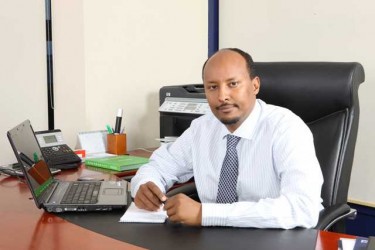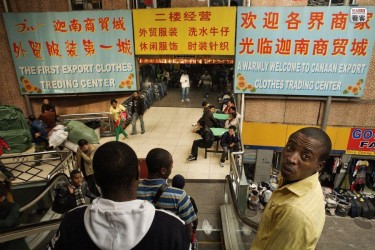African Arguments Online is a multi-blogging platform that covers contemporary African events and develops debates on themes that are important to an ever changing continent. The platform comprises 6 blogs: Making Sense of Sudan, African Politics Now!, Rethinking Zimbabwe, Business Africa, The Central Africa Forum and Diaspora Debate.
Each debate on the multi-blogging site consists of many individual arguments. The first contribution is commissioned from an expert on the theme. Responses are then invited and moderated by the editor.
African Arguments logo. Image courtesy of www.africanarguments.org/
African Arguments Online About page says:
Africa has long been the locus and the focus for the most impassioned and intellectually-informed debate. But for many years, specialist Africa coverage in the world’s media has been in decline, alongside the withering of many African journals and magazines that used to provide a forum for debate and opinion. African news and views have moved to the web, but there has been no comparable Africa-wide movement which provides in-depth analysis and debate of the issues and controversies that animate the continent today. With African Arguments Online we intend to fill this gap.
Let’s take a look at some of the latest arguments posted on the site. In “Making money in Somaliland: meeting Abdirashid Duale, CEO, Dahabshiil”, Magnus Taylor talks to Abdirashid Duale. Abdirashid Duale is CEO of Dahabshiil, which is one of the biggest international money transfer companies in the Horn of Africa.

Abdirashid Duale – CEO of Dahabshiil. Photo courtesy of www.africanarguments.org/
Dahabshiil is an example of how the entrepreneurial strata in Somali society has survived the country’s long-running upheaval. It combines diaspora expertise and money with a particularly strong desire to support communities back home, and in doing so to make a healthy profit in an underdeveloped business environment. Duale tells me that the diaspora are the biggest source of investment in Somalia where, particularly in the more stable regions, the housing and construction sectors are booming. Flights back to Hargeisa, and even to Mogadishu, are frequently booked out, as diasporans, and globe-trotting Somali businessmen fly in to visit extended families and check up on their investments – not the image we normally get of the country.
William Townsend reflects on the elections in the Democratic Republic of Congo:
‘Congo is on the move, but where is it going?’ asked Dr Theodore Trefon (author of the African Arguments book Congo Masquerade) at an international conference, hosted by the Royal African Society in London earlier this week. It was hoped that the historic presidential poll conducted in the Democratic Republic of Congo (DRC) last November, only the second since six years civil conflict came to an end in 2003, would consolidate plurality and herald a new era of political accountability. Instead, Kris Berwouts (until recently, the Director of the Belgium-based European Network for Central Africa) described the unfolding political picture as one of growing uncertainty and pervasive insecurity, limiting opportunities for the Congo’s vibrant civil society to take root and flourish.
Writing about post-civil war politics in Angola, Keith Somerville wonders whether UNITA is sinking after one of its leading member, Abel Chivukuvuku, decided to defect:

Abel Chivukuvuku Chivukuvuku, a former foreign secretary of UNITA. Photo courtesy of www.africanarguments.org/
The desire of UNITA to rebuild itself and develop the support base to seriously threaten the hegemony of the MPLA will not be furthered by the decision of a leading member, Abel Chivukuvuku, to leave and make his own bid for political power, in opposition to the party that has been his home throughout his political career. Chivukuvuku, a former foreign secretary of UNITA when it was a guerrilla movement led by Jonas Savimbi, now wants to run for office in a coalition with former members of the small PRS (Partido de Renovacao Social) party and the Democratic Block…
Jolyon Ford rethinks investor risk in contemporary Zimbabwe:
There is a limit to what one can read into visual impressions made during the Mining Indaba in Cape Town earlier this month….
The Zimbabwe country stand was notable mainly for the relatively large number of well-groomed delegates from the country’s Minerals Marketing Board. The stand however hardly appeared swamped with expressions of interest from conference delegates. Now, given the experiences of many farm, mine and business owners in Zimbabwe in the last decade — and continued political and mining policy uncertainty and potential volatility — it may seem unsurprising that conference attendees largely gave the stand a wide berth.Still, the question remains whether current analysis tends to exaggerate the political risks of investing or operating in Zimbabwe.

Diaspora Debate is a forum for exciting, informed and vigorous debate on the issues engaging the African Diaspora in the United Kingdom and beyond.
The current debate question raised by Dele Fantula is: What’s Diaspora Got To Do With It? The question has attracted reactions from Semhar Araia, Boko Inyundo and Chukwu-Emeka Chikezie.
Dele Fantula argues:
For a long while, Africa’s diaspora have been a trump card afro-optimists have wielded against the pessimists despairing about the future of the continent. Rather than a symptom of a ‘brain drain’, they saw in this large pool of skilled professionals the brightest and best of Africa, who fled the detritus of the failed states of the 70s, 80s, and 90s, and became the vanguard that would transform said basket cases into shining examples of functioning market democracies. So it’s somewhat contrary popular perception to find that the current stability and prosperity in Africa’s nations has had little to [do] with the diaspora.

"Members of the African diaspora in China. Photo courtesy of www.africanarguments.org/
He asks:
So why the faith in a group of people who by and large fled the continent when it was most in need, and returned when it least needs them? Where exactly has the diaspora shown itself to be a glorious knight in shining armor? Are we investing a little too much in this myth about ourselves and too little in the future – most crucially, in the skills and capacity of Africans on the ground?
Semhar responds to Dele's post by pointing out shortcomings in his arguments:
…it’s worth noting that Fatunla fails to define who exactly the diaspora is within the context of his analysis. It is overly simplistic and dangerous to suggest they are “a group of people who by and large fled the continent when it was most in need, and returned when it least needs them”. The diaspora must be disaggregated into its many parts and identify what contributions they actually are providing.
…..
The other shortcoming with What’s Diaspora Got to Do With It is that it falls completely short on recognizing the diaspora’s added value – which is far beyond economic remittances and sporadic tourism. Even though remittances continue to be the largest form of diaspora contributions, amounting to roughly $40 billion a year to support livelihoods and development, it is not the only form of significant deliverables from diaspora.
Chukwu-Emeka notes that most diaspora returnees are ill-equipped to drive change in Africa:
But few of the diaspora returnees will drive change in African countries. For the most part, they will be ill equipped to do so. Think about it. Many will have spent a considerable part of their career in the lower, middle, and senior ranks of their respective occupations. For those who have worked in western developed countries (and some emerging economies), these ranks are typically well defined and structured, and operate in the context of stable institutions, an enabling ecosystem of support, and adequate soft and hard infrastructure.
African Arguments Online is hosted by the Royal African Society and the Social Science Research Council.






